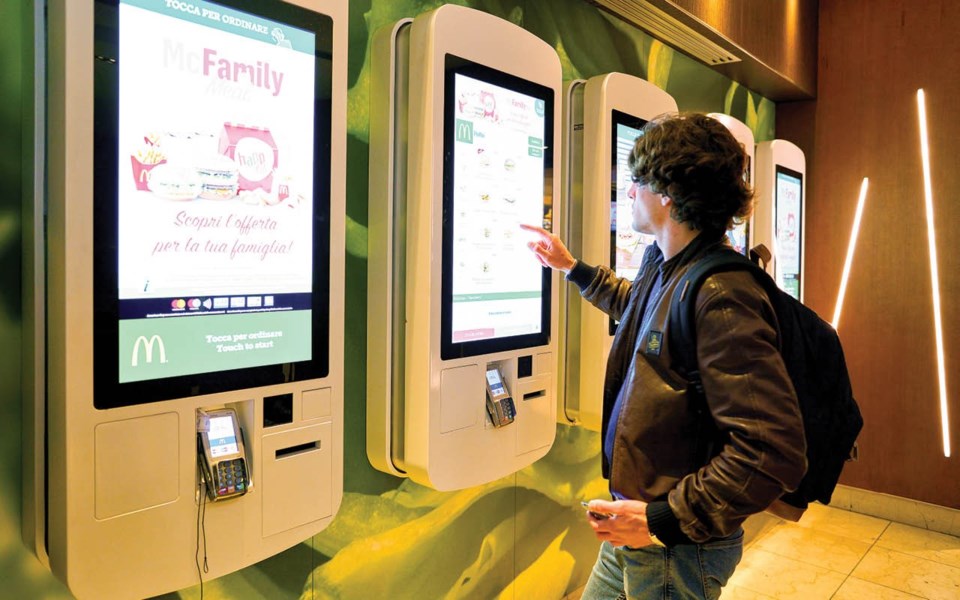In the midst of Whistler's longstanding staffing shortage, it's perhaps the resort's restaurant sector, already known for its high turnover, that has suffered the most. But with the advent of self-serve kiosks and smartphone ordering, tech might be the salve to soothe local restaurants' staffing woes. According to the Whistler Chamber of Commerce's most recent employer survey, 30 per cent of respondents named automation and technical solutions as the top potential "non-HR-related" strategy to overcome staffing challenges.
"I think technology, in the long run, will definitely help with the labour issues we're having," said Chamber CEO Melissa Pace after the results were released.
For Grant Cousar, co-owner of Hunter Gather, embracing new self-ordering technology was a way to add a layer of convenience for an increasingly tech-savvy consumer base. At his Main Street restaurant, customers have a number of ways to order and pay for their meals. Along with traditional counter service, guests can order and pay in advance from a smartphone app or through the restaurant's website, a point-of-sale system developed by California-based Revel Systems. The restaurant also has self-serve kiosks for diners looking to skip the queue.
"They can virtually create an order fairly quickly—sometimes even quicker than going up to our cashier," said Cousar, who added that the self-ordering system has proved particularly useful for the takeout crowd.
Daniel Frankel, owner of Tap & Barrel Restaurants in Vancouver, has positioned his restaurant chain at the forefront of these emerging technologies. He is currently testing new bill payment and ordering technology at Brewhall, a massive, 400-seat brewery and beer hall that opened inside the Opsal Steel building to much fanfare last summer. Similar to Hunter Gather, Brewhall gives customers the option to order from a front counter, or through a self-service system on their smartphones. Frankel said there are also plans to roll out "mobile cashiers" in the New Year, essentially staff members who will scan the room for anyone that may need service.
"Let's say they spot you, glass is half full, they'll be able to walk right up to you with a tablet and say, 'Hey, just so you know, you can mobile order, but let me grab your order right now,'" he said.
Frankel believes the technology, developed by Vancouver company Ready, is well suited to the fast-casual sector, but, with the right approach, could be implemented in any style of restaurant. He hopes to eventually introduce the system at his full-service Tap & Barrel locations, where guests order from the server tableside, but also have the option of ordering and paying online if their waiter is occupied.
"The difference is the Brewhall is designed to let the guest curate their own experience and truly control it however they want, and at the Tap & Barrel, the way that will look is the guest will still be involved, but the server will ultimately still curate the experience—or at least guide it," he explained.
Far from replacing a workforce, the technology effectively allows servers to spend more time interacting with diners face to face, said Laurent May, who heads the seven-employee Ready. "The dining experience is fundamentally a social one and that is not going to change," he wrote in an email. "Our goal is not to replace servers, but to supplement and support them in providing the best guest experience they can. We do that by giving valuable time back to staff. Instead of spending upwards of 15 minutes processing payments per table at the end of the visit, servers can spend more time with guests during service where it matters." May said customers using Ready to pay their cheques tip 7.5 per cent higher than average.
In worker-starved Whistler, where servers are often forced to juggle multiple jobs and long hours to make ends meet, customer service is often the first aspect of the job to fall behind. According to Tourism Whistler's visitor surveys from Summer 2018, the resort's overall customer-service scores fell two points, to 93 per cent—but, at least anecdotally, the impact of the community's staffing shortage on service levels appears to be far greater.
"There's an efficiency in using this technology," noted Pace. "Right now a lot of businesses need that because we don't have the labour to support the service we're trying to maintain."




